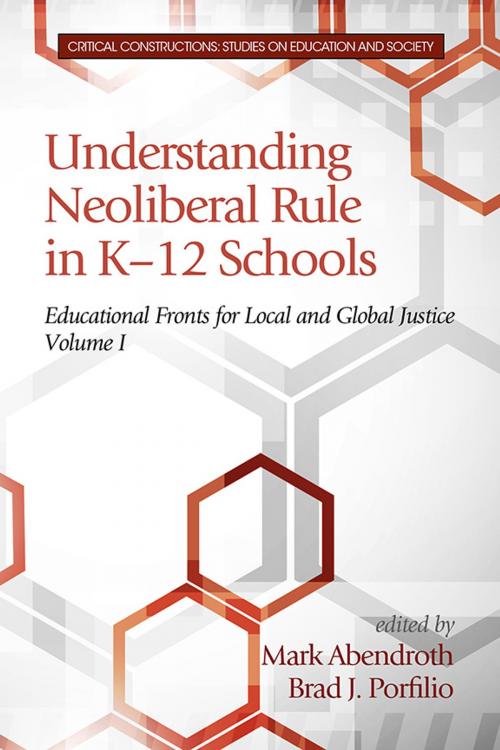Understanding Neoliberal Rule in K12 Schools
Educational Fronts for Local and Global Justice
Nonfiction, Reference & Language, Education & Teaching, Secondary Education, Educational Theory, Educational Psychology| Author: | ISBN: | 9781681231242 | |
| Publisher: | Information Age Publishing | Publication: | June 1, 2015 |
| Imprint: | Information Age Publishing | Language: | English |
| Author: | |
| ISBN: | 9781681231242 |
| Publisher: | Information Age Publishing |
| Publication: | June 1, 2015 |
| Imprint: | Information Age Publishing |
| Language: | English |
The word fundamentalism usually conjures up images of religions and their most zealous followers. Much less often the word appears in connection with political economy. The phrase “free market” gives the connotation that capitalism is freedom. Neoliberalism is the rise of global freemarket fundamentalism. It reaches into nearly every aspect of our daily lives as it seeks to dominate and eliminate the last vestiges of public domains through wanton privatization and deregulation. It degrades all that is public. The good news is that a global community of resistance continues to struggle against neoliberal oppression. Formal and informal education entities contribute to these struggles, offering visions and strategies for creating a better future. The purpose of this volume is twofold. Several contributors will highlight how the neoliberal agenda is impacting educational policy formation, teaching and learning, and relationships between K12 schools and communities. Other contributors will highlight how the global community has gradually become conscious of the ideological doctrine and how it is responsible for human suffering and misery. The volume is needed because the growing body of educational research linked to exploring the impact of neoliberalism on schools and society fails to provide conceptual or historical understanding of this ideology. It is also an important scholarly intervention because it provides insights as to why educators, scholars, and other global citizens have challenged the intrusion of market forces over life inside K12 schools. Teacher educators, schoolteachers, and anyone who yearns to understand what is behind the debilitating trend of commercial forces subverting humanizing educational projects would benefit from this volume. Activists, educators, youth, and scholars who seek strategies and visions for building democratic schools and a society would consider this volume essential reading.
The word fundamentalism usually conjures up images of religions and their most zealous followers. Much less often the word appears in connection with political economy. The phrase “free market” gives the connotation that capitalism is freedom. Neoliberalism is the rise of global freemarket fundamentalism. It reaches into nearly every aspect of our daily lives as it seeks to dominate and eliminate the last vestiges of public domains through wanton privatization and deregulation. It degrades all that is public. The good news is that a global community of resistance continues to struggle against neoliberal oppression. Formal and informal education entities contribute to these struggles, offering visions and strategies for creating a better future. The purpose of this volume is twofold. Several contributors will highlight how the neoliberal agenda is impacting educational policy formation, teaching and learning, and relationships between K12 schools and communities. Other contributors will highlight how the global community has gradually become conscious of the ideological doctrine and how it is responsible for human suffering and misery. The volume is needed because the growing body of educational research linked to exploring the impact of neoliberalism on schools and society fails to provide conceptual or historical understanding of this ideology. It is also an important scholarly intervention because it provides insights as to why educators, scholars, and other global citizens have challenged the intrusion of market forces over life inside K12 schools. Teacher educators, schoolteachers, and anyone who yearns to understand what is behind the debilitating trend of commercial forces subverting humanizing educational projects would benefit from this volume. Activists, educators, youth, and scholars who seek strategies and visions for building democratic schools and a society would consider this volume essential reading.















